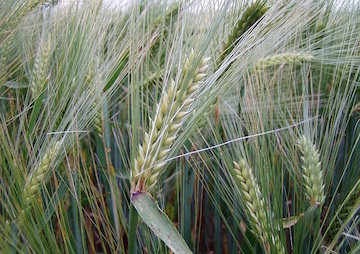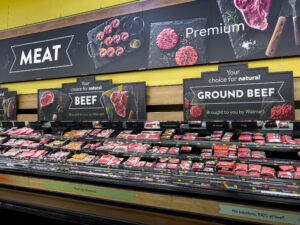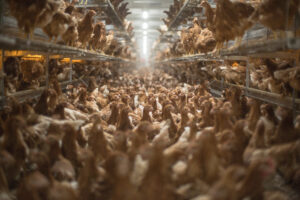Climate Change Affects European Farmers’ Yields
Scientists says changes in temperature and snow or rainfall are key factors in the stagnation of wheat and barley yields across Europe since the early 1990s.
By Tim Raford, Climate News Network

Ears of winter barley ripening in a field in Belgium. (raul.dupagne via Wikimedia Commons)
This Creative Commons-licensed piece first appeared at Climate News Network.
LONDON — Farmers in Europe have already begun to feel the pinch of climate change as yields of wheat since 1989 have fallen by 2.5% and barley by 3.8% on average across the whole continent.
And two Californian scientists now believe that changes in temperature and snow or rainfall during the last quarter of a century are at least partly to blame.
The pinch may be gentle, but environmental scientists Frances Moore and David Lobell, of Stanford University, believe it is real.
They report in the Proceedings of the National Academy of Sciences that although changes in farming and environmental policies explain much of the stagnation of yields in Europe in the last 25 years, at least 10% of this change could be attributed to climate trends.
Sugarbeet and maize harvests have gone up slightly — and that, too, could be pinned on global warming.
Overall trends
It is no small challenge to find an overall trend to crop yields across a continent that stretches from Scotland to the Black Sea, from northern Norway to Sicily, and over a timescale that embraces floods, droughts, forest fires and heat waves that may or may not have been made worse or more frequent by global warming, but which would have occurred anyway.
The other complication is that, in the same 25 years, the patterns of agricultural subsidy and market demand have also changed.
But the Stanford scientists started with conditions on the farms in the 1980s, when Europe’s farmers were, on average, getting 0.12 more tonnes of wheat and barley per hectare than the year before. Yields per field were rising steadily.
“Agriculture is one of the economic sectors most exposed to climate change impacts.”
“If they had continued growing at that rate after 1995, wheat and barley yields would be 30% and 37% higher today, respectively,” they write.
Climate trends could perhaps account for around 10% of the stagnation revealed in the statistics. The remaining change could be put down to economic and political shifts and other factors.
One of these would be that crops had been improving to a point called the biophysical limits: just how much weight of grain could one stalk hold anyway? So some change would be expected, and climate must be a component of that.
To arrive at their conclusion, the two scientists looked at the predictions made for climate change — southern Europe was always expected to become drier, but farmers in moist northern climates could benefit from temperature increases — and the available data, and then applied sophisticated mathematical probability techniques to isolate the possible impact of climate change so far.
Social costs
They have looked at the economic and social challenges of global warming before. Last year, they warned that Europe’s farmers were going to have to adapt to climate change in the 21st century, and Moore and a colleague claimed last month that economists had badly underestimated the economic and social costs of each tonne of carbon added to the levels of CO2 in the atmosphere.
The new research is, they argue, important because “agriculture is one of the economic sectors most exposed to climate change impacts, but few studies have statistically connected long-term changes in temperature and rainfall with yields.
“Doing so in Europe is particularly important because yields of wheat and barley have plateaued since the early 1990s, and climate change has been suggested as a cause of this stagnation.”
Your support matters…Independent journalism is under threat and overshadowed by heavily funded mainstream media.
You can help level the playing field. Become a member.
Your tax-deductible contribution keeps us digging beneath the headlines to give you thought-provoking, investigative reporting and analysis that unearths what's really happening- without compromise.
Give today to support our courageous, independent journalists.






You need to be a supporter to comment.
There are currently no responses to this article.
Be the first to respond.